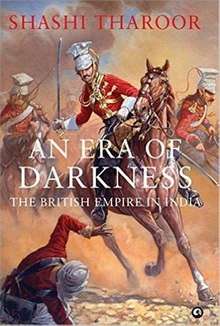Inglorious Empire
Inglorious Empire: What the British Did to India, first published in India as An Era of Darkness: The British Empire in India, is a work of non-fiction by Shashi Tharoor, an Indian politician and diplomat, on the effects of British colonialism on India. The book has won widespread acclaim and won Tharoor the 2019 Sahitya Akademi Award [1] and the 2017 Ramnath Goenka Excellence in Journalism Award.[2]
 Indian edition | |
| Author | Shashi Tharoor |
|---|---|
| Language | English |
| Genre | History |
| Publisher | Aleph (India) C. Hurst & Co. (UK) |
Publication date | March 2017 |
| ISBN | 978-1-84904-808-8 (hardcover) |
Background
Tharoor made a speech at a 2015 Oxford Union debate on the topic "Does Britain owe reparations to its former colonies?", which went viral over the web. Subsequently, his publisher floated the idea to transform the speech into a book; despite being initially sceptical, he went on to write a 330 page book.[3][4]
Reception
The book has won a lot of acclaim as well as some criticism.
The Hindu Business Line called the book "one breathless read".[5] The Guardian called it a "passionately argued book [which] provides a crushing rebuttal of such ideas with regard to India".[6]
Tabish Khair praised the book for presenting an 'intricate mixture of fact and anecdotes' that served as an effective counter to the view of 'colonial apologists' but at the same time, did praise the British, when it merited.[4]
In a review published in the Cambridge Review of International Affairs, economic historian, Tirthankar Roy, a faculty at the London School of Economics heavily criticized the book. He noted that whilst the facts were beyond dispute Tharoor's analysis and interpretation were wrong.
Another review of Inglorious Empire, published in the Literary Review, by historian John Keay, whose many writings on India include India: A History, applauds Tharoor for "tackling an impossibly contentious subject". However, he deplores the fact that "moral venom sometimes clouds his judgement" and notes that many of Tharoor's statistics are seriously out of date, many coming from the polemics contained in the American Will Durant's Story of Civilisation written in the 1930s, which itself drew on the even earlier work of the crusading American missionary Jabej T. Sutherland, author of India in Bondage.[7]
A more detailed criticism of Tharoor's book and his use of statistics was set out by the writer of South Asian history Charles Allen in a lecture entitled Quis custodiet ipsos custodes: who owns Indian history? read to the Royal Society for Asian Affairs in London on 25 April 2018. A revised version was published in Asian Affairs under the revised title Who Owns India's History? A Critique of Shashi Tharoor's Inglorious Empire.[8]
References
- DelhiDecember 18, India Today Web Desk New; December 18, 2019UPDATED:; Ist, 2019 20:15. "Shashi Tharoor wins Sahitya Akademi Award 2019 for An Era Of Darkness". India Today. Retrieved 2020-04-14.CS1 maint: extra punctuation (link) CS1 maint: numeric names: authors list (link)
- "Vice-President Venkaiah Naidu presents 12th edition of Ramnath Goenka Excellence in Journalism Awards". Firstpost. Retrieved 2020-04-14.
- Bangalore Literature Festival (2017-01-15), Inglorious Empire, The reality of the British Raj | Shashi Tharoor with Sanjeev Sanyal, retrieved 2017-09-09
- Tabish Khair (2018). "Inglorious Empire: What the British did to India". Journal of Postcolonial Writing. 54 (3): 432–433. doi:10.1080/17449855.2017.1330759.
- Balakrishnan, Uday. "The bald truth is — the Raj ruined us". @businessline. Retrieved 2020-04-14.
- Smith, P. D. (2018-02-23). "Inglorious Empire by Shashi Tharoor review – what the British did to India". The Guardian. ISSN 0261-3077. Retrieved 2020-04-14.
- Keay, John (March 2017). "Bristling with Raj". Literary Review. Retrieved 10 February 2018.
- Charles Allen (2018). "Who Owns India's History? A Critique of Shashi Tharoor's Inglorious Empire". Asian Affairs. 49 (3): 355–369. doi:10.1080/03068374.2018.1487685.